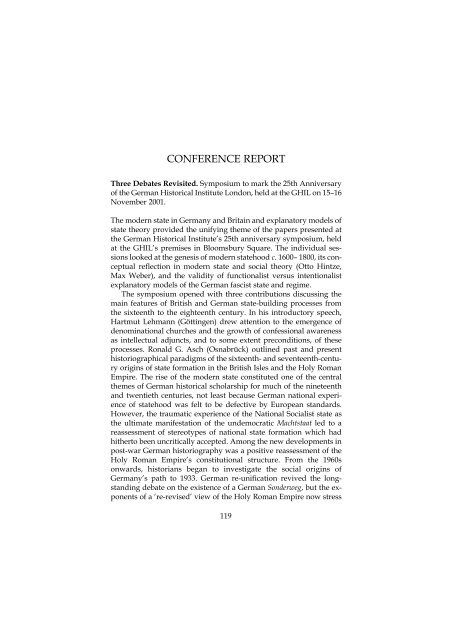Download - German Historical Institute London
Download - German Historical Institute London
Download - German Historical Institute London
You also want an ePaper? Increase the reach of your titles
YUMPU automatically turns print PDFs into web optimized ePapers that Google loves.
CON�ERENCE REPORT<br />
Three Debates Revisited. Symposium to mark the 25th Anniversary<br />
of the <strong>German</strong> <strong>Historical</strong> <strong>Institute</strong> <strong>London</strong>, held at the GHIL on 15–16<br />
November 2001.<br />
The modern state in <strong>German</strong>y and Britain and explanatory models of<br />
state theory provided the unifying theme of the papers presented at<br />
the <strong>German</strong> <strong>Historical</strong> <strong>Institute</strong>’s 25th anniversary symposium, held<br />
at the GHIL’s premises in Bloomsbury Square. The individual sessions<br />
looked at the genesis of modern statehood c. 1600– 1800, its conceptual<br />
reflection in modern state and social theory (Otto Hintze,<br />
Max Weber), and the validity of functionalist versus intentionalist<br />
explanatory models of the <strong>German</strong> fascist state and regime.<br />
The symposium opened with three contributions discussing the<br />
main features of British and <strong>German</strong> state-building processes from<br />
the sixteenth to the eighteenth century. In his introductory speech,<br />
Hartmut Lehmann (Göttingen) drew attention to the emergence of<br />
denominational churches and the growth of confessional awareness<br />
as intellectual adjuncts, and to some extent preconditions, of these<br />
processes. Ronald G. Asch (Osnabrück) outlined past and present<br />
historiographical paradigms of the sixteenth- and seventeenth-century<br />
origins of state formation in the British Isles and the Holy Roman<br />
Empire. The rise of the modern state constituted one of the central<br />
themes of <strong>German</strong> historical scholarship for much of the nineteenth<br />
and twentieth centuries, not least because <strong>German</strong> national experience<br />
of statehood was felt to be defective by European standards.<br />
However, the traumatic experience of the National Socialist state as<br />
the ultimate manifestation of the undemocratic Machtstaat led to a<br />
reassessment of stereotypes of national state formation which had<br />
hitherto been uncritically accepted. Among the new developments in<br />
post-war <strong>German</strong> historiography was a positive reassessment of the<br />
Holy Roman Empire’s constitutional structure. �rom the 1960s<br />
onwards, historians began to investigate the social origins of<br />
<strong>German</strong>y’s path to 1933. <strong>German</strong> re-unification revived the longstanding<br />
debate on the existence of a <strong>German</strong> Sonderweg, but the exponents<br />
of a ‘re-revised’ view of the Holy Roman Empire now stress<br />
119













